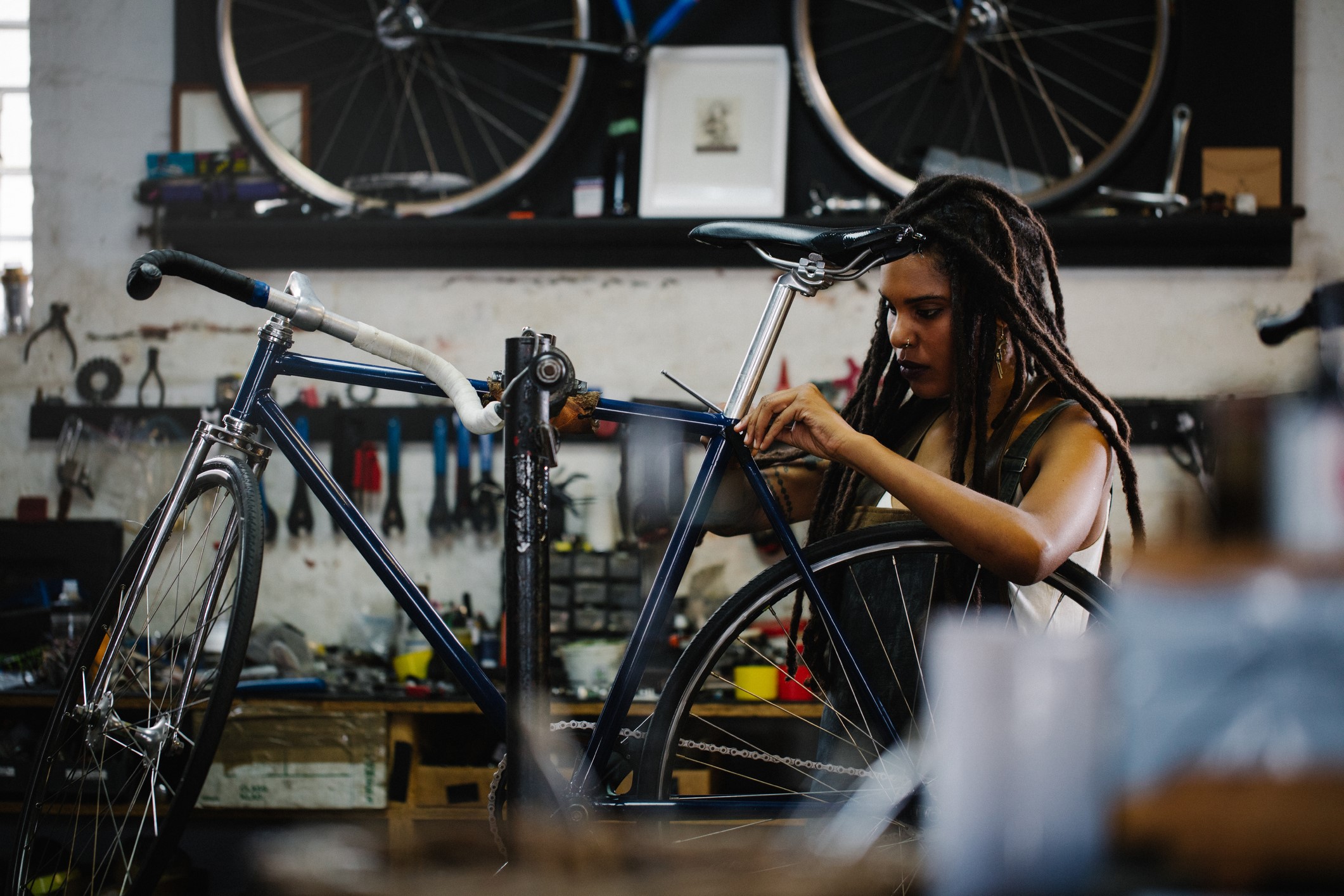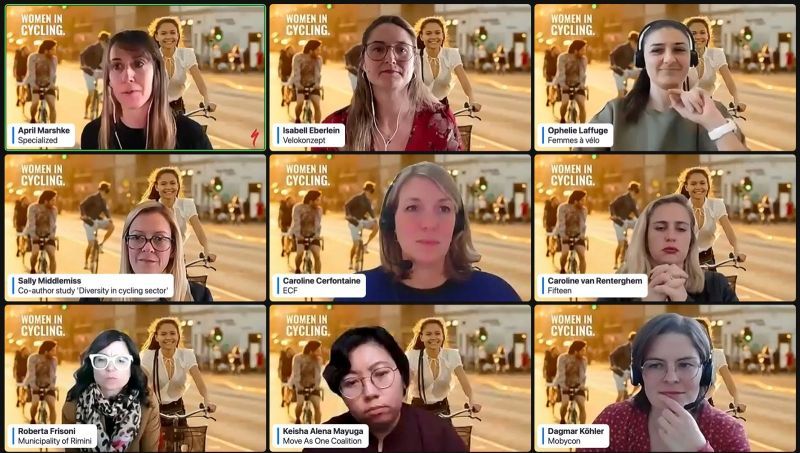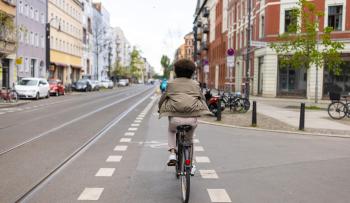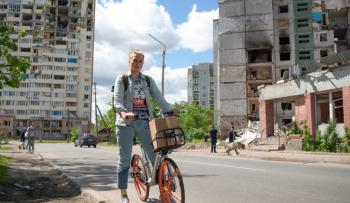
“We have gone as far as we can; We need more diversity, more women, to bring cycling advocacy further.”
Last week’s Women in Cycling Webinar successfully convened with over 700 registrations to focus on the current challenges and opportunities faced by the cycling sector's diversity landscape.
The webinar, addressing the critical theme of "Towards more diversity in the cycling industry", was hosted by Women in Cycling, an initiative launched by ECF in collaboration with CIE, Velokonzept, Mobycon and CONEBI, aiming to boost diversity in the cycling sector. Led with insights and ways to move forward from featured panellists, including ECF Director of Velo-city Caroline Cerfontaine and Brussels Mobility Minister Elke Van Den Brandt, among other women industry leaders and transport professionals.
The cycling sector, historically dominated by men, is undergoing a paradigm shift. Despite the increased visibility of women and marginalised groups in leadership roles, the industry faces significant challenges in retaining talent. April Marshke of Specialized noted, “I have seen so many women come into the industry, but I have also seen our sector lose a lot of really smart women due to the lack of support.”

Recent data cited from the “Diversity in the Cycling Sector” study reveals alarming trends. A reported 71% of women in the cycling industry are considering leaving, surpassing a significantly lower 40% figure in the automotive industry. Additionally, the cycling industry remains largely comprised of white, straight men, highlighting the barriers to inclusivity and diversity that the sector is faced with.
The data is clear; The lack of access to support and resources is particularly evident for not only women but also LGBTQ+ people, women with children, women of colour and disabled women, among many more marginalised groups. The report, conducted by the Diversity in Cycling project, shows that 52% of ethnic minority respondents feel free to be themselves at work versus a comparable 84% of white people. “I am tired of fighting for respect in this industry”, one person said of fighting for accessibility needs within the sector.
Brussels’ Mobility Minister, Elke Van der Brandt, addressed these challenges directly, likening the need for diversity in the cycling sector to a balance of “hardware” and “software”. While investing in infrastructure is the foundational "hardware" for encouraging more women to cycle, focusing on the "software" is equally as important. For example, providing cycling courses to encourage lasting communities of support for women and diverse groups.
Hearing From Women in Leadership in the Cycling Industry
The webinar showcased inspiring voices and initiatives driving change within the industry from featured panellists. Caroline van Renterghem of Fifteen emphasised the need for genuine representation, advocating for more participation of women in tech teams and bike design and not only in administrative roles or sales teams, stating, "Where women are matters, not only the percentage of the total workforce.” While Roberta Frisoni, Deputy Mayor of Urban Planning and Transport at the Municipality of Rimini, Italy, highlighted the importance of prioritising women at the centre of city planning to boost safety and accessibility. Remarking, “What matters is the diversity of experiences that bring different perspectives.”
Keisha Alena Mayuga from the Move as One coalition began noticing the lack of cycling infrastructure and women cyclists in her local area. Subsequently advocating for pop-up bike lanes and leading the development of 500km of national-level bike lanes in the Philippines, Mayuga highlighted the importance of visibility and accessibility for marginalised groups. “When talking about diversity in cycling, keep asking ourselves: who else are we excluding? We are not trained in inclusivity either.”

Despite these challenges, there are signs of progress. Caroline Cerfontaine, Director of Velo-city at ECF, noted a significant increase in women occupying leadership roles within the cycling advocacy sector. At ECF, not only have we gained our first female CEO, Jill Warren, but the ECF Board has changed in 2020 from six men and two women to the current equal split of four men to four women. Additionally, of the 12 largest ECF members, six have changed from male-led CEOs to women-led CEOs.
Call to Action
Sally Middlemiss, founder of the Diversity in Cycling project, outlined seven key actions to guide progress towards inclusive culture, representation and accountability in the cycling industry.

Upcoming Events for Women in Cycling
Listed below are upcoming networking events Women in Cycling is involved with:
- 27 April, 10 AM CET: Webinar: ‘Meet the Cycling Sector Experts’ – coffee & chat with women leaders in the cycling sector. Register here: https://www.linkedin.com/events/meettheexperts-training-nutriti7052249286662578176/about/
- 18 June, 12:15 PM CET: Velo-city 2024 (Ghent) & lunch. Buy your ticket today: https://www.velo-city-conference.com/en/tickets-info/tickets/
- 5 July: Women in Cycling breakfast at EuroBike 2024 (Frankfurt). Register: https://cyclingindustries.com/news/details/cie-at-eurobike-1
- 2 October: CIE Summit 2024 (Brussels)
- 22-24 May: IMBA Summit (Modling) women in cycling, mountain biking, and trail building
To watch the full webinar, click here.
Topics:
Contact the author
Recent news!
Contact Us
Avenue des Arts, 7-8
Postal address: Rue de la Charité, 22
1210 Brussels, Belgium









